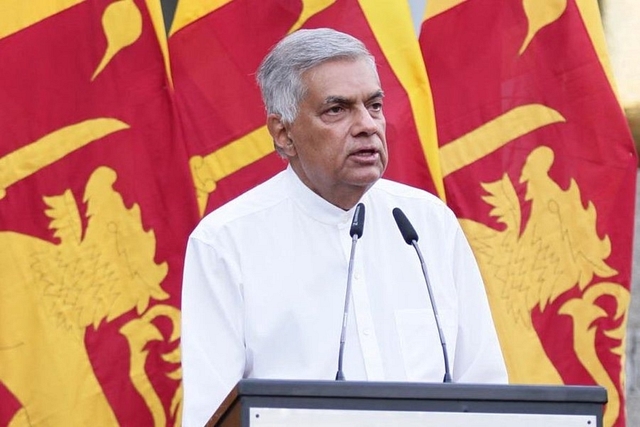
Sri Lankan President Holds All-Party Meeting On 13A For Peaceful Resolution Of Tamil Issue
Colombo, Dec 14 (PTI) An all-party meeting convened by President Ranil Wickremesinghe has discussed the 13th Amendment to Sri Lanka's Constitution as mooted by India to resolve the long-standing demand for political autonomy for the minority Tamils in the island nation, political leaders said on Wednesday.
The Tamil parties which participated in the meeting on Tuesday urged the government to hold the northern provincial council election.
“The 13A is already a part of the Constitution and it is a point that most parties agreed to,” Tamil Progressive Alliance (TNA) leader Mano Ganesan told PTI.
Ganesan, who represents mostly the Western province-based Tamils of Indian origin, said President Wickremesinghe has asked him to forward proposals on the 13A issue on behalf of the hill country Tamil community or the Tamils of Indian origin.
India has been pressing Sri Lanka to implement the 13th Amendment which was brought in after the Indo-Sri Lankan agreement of 1987. The 13A provides for devolution of power to the Tamil community.
Ganesan said President Wickremesinghe, main opposition leader Sajith Premadasa and former president Mahinda Rajapaksa were all in agreement with implementing the 13A.
He urged the government to hold provincial council elections in the northern and eastern provinces so as to give people an idea of self-governance with the full implementation of 13A.
C V Wigneswaran, former chief minister of the Northern province, said ensuring the councils to have already defined powers which have been denied to the provinces was discussed in the all-party meeting.
“We raised the issue of land grabbing by the state. They are taking over lands under government departments. This must stop and the land rights must be given to the provincial councils,” Wigneswaran told PTI.
He said other issues concerning the Tamil minority and the release of political prisoners held under the draconian Prevention of Terrorism Act (PTA) were also discussed in the meeting.
President Wickremesinghe had called Tuesday's All Party Conference in a bid to arrive at a consensus on the Tamil minority's demand for political autonomy.
Wickremesinghe had said he was keen to announce a settlement of the issue by February 4 of next year, coinciding with Sri Lanka's 75th anniversary of Independence.
“We have very little time so we can’t afford to go back and start all over again,” Ganesan stressed.
Meanwhile, there were no immediate comments from pro-Sinhala majority nationalist parties on Tuesday's talks. All Sinhala parties were present in the meeting, Ganesan said, adding that only Janatha Vimukthi Peramuna (JVP), the third largest majority community party, abstained from the parleys.
The Sinhala majority hardliners have been advocating a total abolition of the island’s provincial council system established in 1987. There are nine provincial councils in Lanka.
Sinhalese, mostly Buddhist, make up nearly 75 per cent of Sri Lanka’s 22 million population while Tamils are 15 per cent.
Addressing Parliament on November 10, Wickremesinghe, without naming any country, had said that Sri Lanka did not need outside intervention in its internal affairs, as he invited the Tamil minority parties to hold talks to resolve some of the outstanding issues they faced.
'I invite all of you to have talks next week and settle all outstanding issues before the 75th anniversary of independence,' he said.
The main Tamil party TNA with 13 members in the 225-member assembly decided not to oppose the government budget for 2023 after Wickremesinghe made overtures for talks.
Sri Lanka had had a long history of failed negotiations to end the Tamil claim of discrimination by allowing some form of political autonomy.
An Indian effort in 1987 which created the system of a joint provincial council for the Tamil dominated north and east was faltered as the Tamils claimed it fell short of full autonomy.
Wickremesinghe himself tried an aborted constitutional effort between 2015-19 which too came to be scuttled by the hardline majority politicians.
The Tamils put forward their demand for autonomy since gaining independence from Britain in 1948 which from the mid 70s turned into a bloody armed conflict.
Over the years, the Sri Lankan government has been aggressive against Tamilian groups following its war with the Liberation Tigers of Tamil Eelam (LTTE).
The LTTE ran a military campaign for a separate Tamil homeland in the northern and eastern provinces of the island nation for nearly 30 years before its collapse in 2009 after the Sri Lankan Army killed its supreme leader Velupillai Prabhakaran.
According to Sri Lankan government figures, over 20,000 people are missing due to various conflicts including the three-decade brutal war with Lankan Tamils in the north and east which claimed at least 100,000 lives. International rights groups claim at least 40,000 ethnic Tamil civilians were killed in the final stages of the war, but the Sri Lankan government has disputed the figures.
(This story has been published from a wire agency feed without any modifications to the text. Only the headline has been changed.)